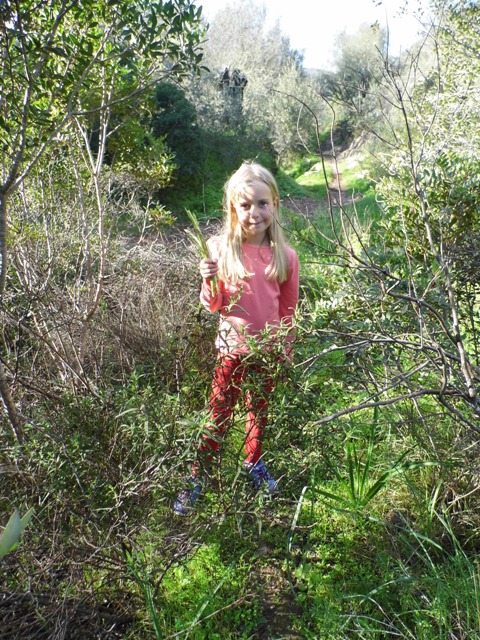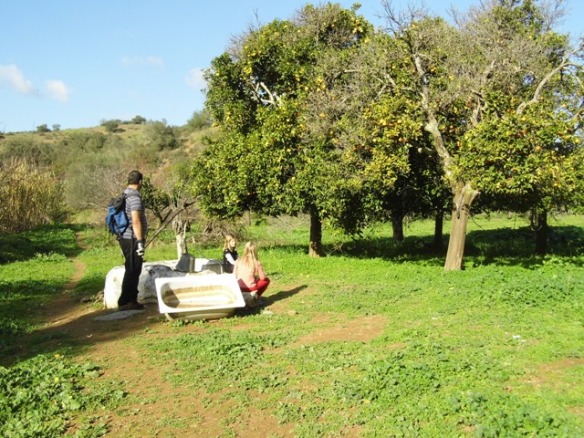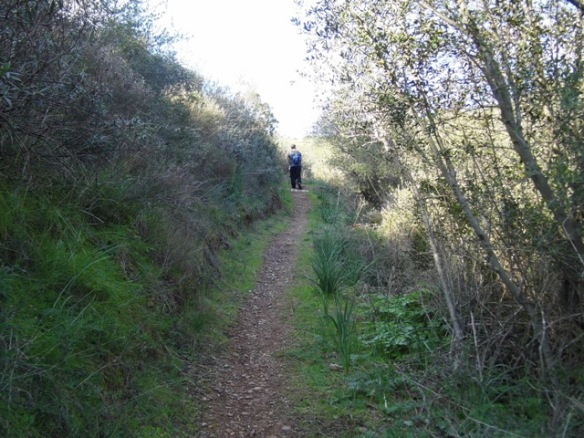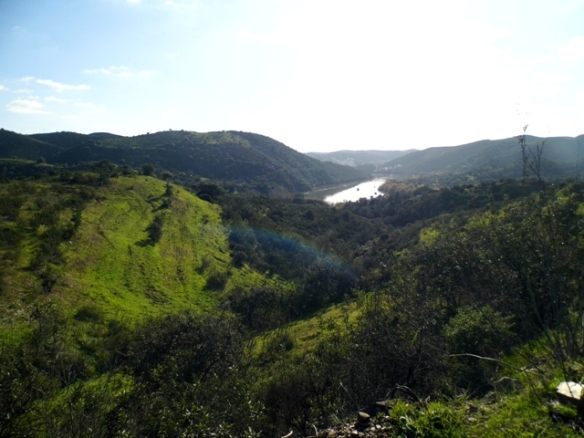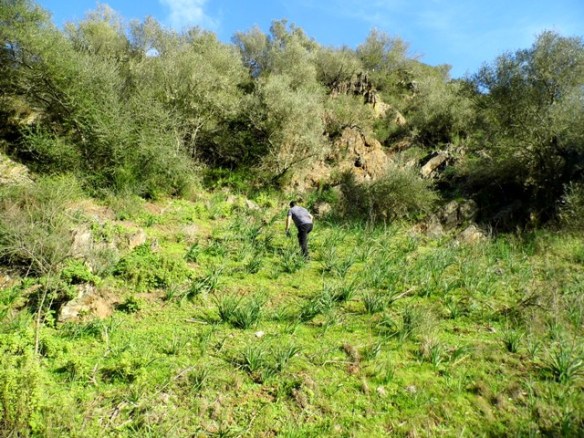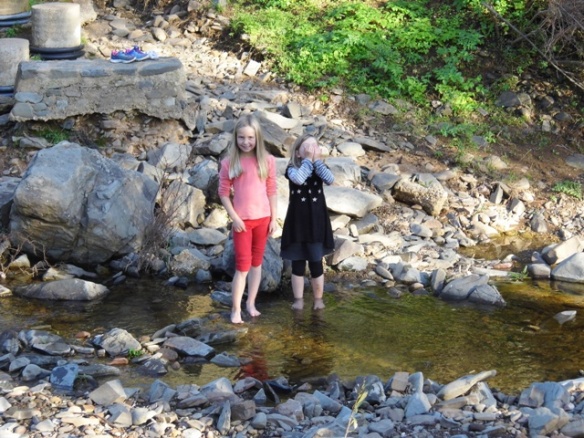Some weeks ago, a rather Bohemian acquaintance of ours asked if we’d house- and dog-sit for him. Our friend had to go to the UK for medical treatment and anticipated being away for up to a month. ‘Sure’, I nonchalantly agreed, without giving too much (indeed any) thought to the logistics of the thing. I wrote the start date in my diary and thought only of what fun it would be to live for a while in such an idyllic location.
Our friend lives downriver from Sanlúcar on a picturesque piece of land, with the river in front of the property and the Guadiana Way, an old goat track turned hiking trail, behind. There is no road access to the property, so getting to and from town is either a 25-minute walk along the beautiful hiking trail or a 5 to 15 minute dinghy ride (depending on the tide) up the river.
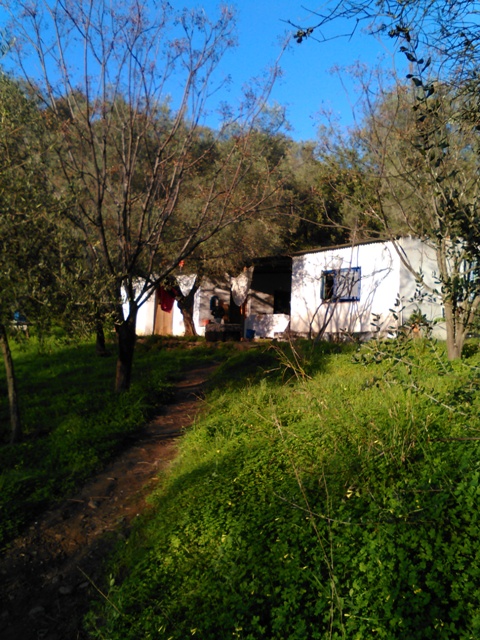
The old shepherd’s hut transformed into kitchen, bedroom and bathroom
Being an artist, a musician and somewhat of a free spirit, our friend’s plans for departure were loose and ever-changing. I walked down the goat track on Monday, the day before we were due to move in, so he could show me what I needed to know to take care of and live in the place – where, when and how to feed the dog, how to check and replace the battery acid in the batteries connected to the solar panels, how to use the water pump and washing machine. It was a bright sunny morning and the place was filled with possibility – the orange and lemon trees heavy with fruit, the almond tress just coming into blossom, the opportunities for the girls to have a new place for adventures, and the inspiration I would soak up for the new magazine article I was about to start writing.
The dog, Chester the Chicken Molester, a little Jack Russelly type thing, wasn’t there when I visited. He’d gone to town in search of Claudia, the 19-year old bitch with whom he is in love and who falls over every time Chester, or any other dog, mounts her (she’s such a stalwart). His owner didn’t seem too concerned at Chester’s absence, and said it was a regular occurrence.
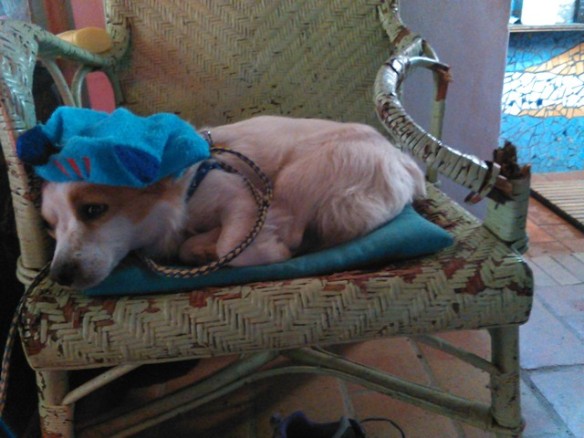
Chester enduring the shower cap Katie dressed him up in.
By the time I was ready to leave, our friend had decided he wouldn’t now depart until Wednesday. That was fine by me, as we planned on moving Carina off her berth on the pontoon and onto anchor in the river in front of the house on Wednesday, Julian’s day off. On Tuesday night our friend postponed his departure yet again, this time until Friday. Whenever I mentioned our plans to friends, they rolled their eyes and told me how sorry they felt for me, given our friend’s free-spirited approach to life, the dog’s fondness for Claudia and the fact that heavy rain was forecast for the next four days.
On Wednesday we moved Carina downriver, and on Thursday night, as the girls and I crossed the Guadiana from Sanlúcar to Alcoutim in the dinghy after dark, to collect Julian from work, who should we meet crossing in the other direction but our friend and his dog. ‘I have to go right now’, he told me, and explained the unforeseen circumstances that meant he had to leave right this minute, in the pitch dark. I took it all in my stride, and after some convoluted manoeuvres, our friend was on the Sanlúcar side of the river, and the four of us, with Chester the Chicken Molester, our dinghy and our friend’s boat, on the Alcoutim side of the river.
By now it was 8pm and we faced the prospect of our first night in a house we had never stayed in before. Now, bear in mind, our friend is a Bohemian, an artist, a musician, so the things many of the rest of us take for granted just don’t enter our friend’s (often up in the clouds) head. He and I have, ahem, somewhat different standards of hygiene, and I am somewhat more partial to artificial lighting than he is.
We rowed downriver on the ebb, me, the girls and Chester in our friend’s boat, and Julian in our dinghy. Before going ashore we stopped off at Carina so I could quickly pick up some food for dinner and breakfast, our toothbrushes and a few other bits and pieces to see us through the night and next morning. Once ashore, we stumbled up the rickety landing stage and up the dirt path, to the part of the house where we intended to spend the night. The wood burning stove was alight in the bedroom, so at least we had a warm place to sleep.
‘What an adventure’ I tried to tell myself, as I set about making supper in a poorly provisioned and decidedly messy kitchen, my heart sinking when I realised I had forgotten to bring teabags from the boat. There was nowhere for Julian to sleep, so once he had seen us settled in, he returned to Carina for the night.
Our friend had told me of the snake that lives in the rafters in the kitchen and I imagined all the creepies and crawlies and rodents that might be lurking in this indoors/outdoors house, and was thankful to have the girls with me so I could put on fake bravery. I was also glad of Chester. Chester slept on the end of the bed for the night and when he woke me up at 7.20 next morning whining to be let out, I knew it was time to get up, despite the impenetrable darkness that made it feel as though it was still the middle of the night.
I quickly got dressed and went outside to go to the kitchen, which is situated in a different building to the bedroom. Chester was gone! I walked the girls to school along the trail and found Chester sitting outside the house of his lady love. I brought him home and spent the morning cleaning the kitchen from top to bottom and rowing over to Carina to pick up more provisions (TEA!). At some point mid-morning Chester was sitting in the sun, dozing. Five minute later, he was gone. Grrrr. Back in along the trail I walked to collect the girls from school and to once again retrieve Chester from outside the house of his girlfriend.
Just as school ended, the rain started. For the rest of the weekend it rained and rained and rained, torrentially and Biblically at times, with thunder rumbling and lightning lighting up the sky. The joys of living in the wilds were suddenly not so obvious. All weekend I struggled to keep my cool, at times losing my temper with the kids, when really I was losing my temper with this house, its owner and its love-struck dog.
On Friday afternoon I set about cleaning the bedroom and bathroom and getting the fire in the stove going again. Now, I grew up in a house with three turf fires, so lighting fires is no problem to me…usually. It’s only a problem when there are no implements, instruments or tools for (a) cutting the wood to size, (b) cleaning out the ashes, (c) raking the ashes and moving the burning wood around in the fire. On top of everything else, it was raining and what wood there was, was lying down on the landing stage, soaking wet. ‘I hate this. I want to go home to Carina’, I grumbled, as I fumbled around in the dark bedroom (in the middle of the day with the light on) trying to find my head torch which I had mislaid the night before. (Oh the irony of losing my head torch in the dark).
But necessity, of course, is the mother of all invention, and by Saturday evening I had improvised methods for (a) cutting the wood to size, (b) cleaning out the ashes, and (c) raking the ashes and moving the burning wood around in the fire. I sent the girls off in their raincoats and rubber boots to find firewood and they came back with bundles of damp branches and twigs, which we dried out in front of the now-lit fires.
Julian remained on the boat on Friday night, as I still hadn’t sorted out sleeping accommodation for him. While the girls and I slept a bit squished in the bedroom, I planned to put Julian in the artist’s studio, 50 yards away on the other side of the plot of land. The studio was filthy and dusty, so Saturday was spent changing bedding on the rather comfy bed in there, sweeping and tidying, and transforming the place into a comfy living room come bedroom, where we could all relax and play and eat in front of the wood burning stove.
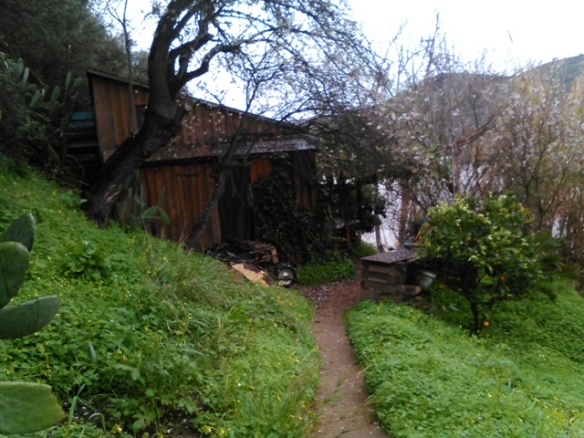
The studio – Wendy house by day, Julian’s private domain by night!
On Saturday morning Chester disappeared again as soon as he was let out in the morning (despite, this time, wearing his electric dog collar – it turns out the electric fence doesn’t run all the way around the property and Chester had sniffed out the gaps). Once the studio was ship shape, and during a brief gap in the rain, the girls and I wandered up the trail and into town to once again find Chester sitting outside the house of his love, this time soaked to the skin and looking rather sorry for himself.
That’s it, I said to myself. The electric collar clearly didn’t work, so the next step was to keep Chester on a long lead all the time, unless he was inside one of the buildings on the property. His owner had told me to do so, and has a long rope for the purpose. All was going well on Sunday morning. We even had some brief moments of sunshine in between the downpours. Lily and Katie played down in the studio – which has its own outside roofed bar and barbecue area – enjoying have their own giant Wendy house to play in. At some point in late morning, Katie felt sorry for poor old Chester on his long lead, and decided to free him so he could come play in the Wendy house (Chester is not a playing sort of dog!). Five minutes later he was gone again, and five minutes after that the heavens opened and it rained torrentially until the early hours of Monday morning. I knew where Chester had gone, and I wasn’t too worried about him, so decided not to go pick him up until Monday morning when I walked the girls to school.
For the rest of Sunday we kept warm in the studio, the girls doing art while I read and wrote, and then carried a big pot of stew down from the kitchen which stayed warm on the stove. Chester didn’t know what he was missing, and all for what? A girlfriend who puts out for any and every dog who comes her way! Silly Chester!
On Monday morning Chester was, of course, where I expected he would be, feeling sorry for himself, cold and hungry. I brought him home, and he hasn’t been back into town unaccompanied since. The rain eased on Monday and the sun has been out each day since.
It’s been an interesting introduction to life on the land. In our cabin(s) in the woods I have been torn between the romance of Henry Thoreau’s Walden and being really bloody annoyed with the realities of moving into someone else’s home in the rain and cold. I loved the place and five minutes later I hated the place. I was warm and cosy by the fire, or I was wet and dirty trying to light the fire. I had all that I needed and I had nothing that I needed!
That was a week ago, and we’ve nicely settled in now and are enjoying life in our little Walden de Guadiana. We’ve had guests around for supper, we’ve picked oranges, we’ve enjoyed breath-taking star-filled night skies, and Chester and I have developed a grudging fondness for each other! Expect more positive blog posts to follow!




